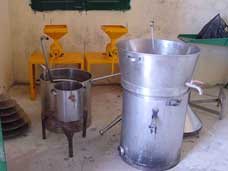|
In Tunisia, the active involvement of women was an integral part of the Programme. A project development committee was constituted and took gender balance into consideration in its constitution. Women took an active part in the community diagnostic process, which was set up to identify local problems and actions to be undertaken for sustainable development in the Rhim area. A gender analysis was conducted in order to understand the way in which women's and men's roles interact with the environment and agro-forestry.
Workshops were organized with women to sensitize them to the importance of natural resources, particularly fuel wood, and show them how to use them in a sustainable way. They also permitted the identification of programme beneficiaries.
A training course in gender analysis was conducted for staff and programme participants. Its objectives were to develop skills of male and female participants to conduct gender analysis, to use various methods of collecting gender-disaggregated data in each phase of the project process, to use results of diagnostic surveys to identify interventions which benefit women of the community and to develop a gender-focused action plan.

Micro projects were set up for women in an effort to improve their living conditions and participate in the economic life of the region. These projects were of apiculture, aviculture, rabbit breeding, weaving, sawing and distillation and drying of medicinal plants. Women received training, in order to implement these new income generation activities and improve their family revenues. Moreover, literacy classes were organized and a meeting point for women was built.
Finally, three wells and three majels, which are traditional tanks designed to collect water rain, were constructed with the participation of the population. Since women are the principal water collectors and managers, they were the principal beneficiaries of this action.
|


